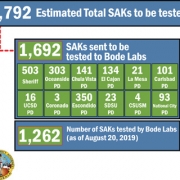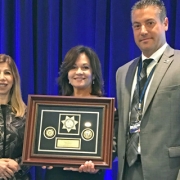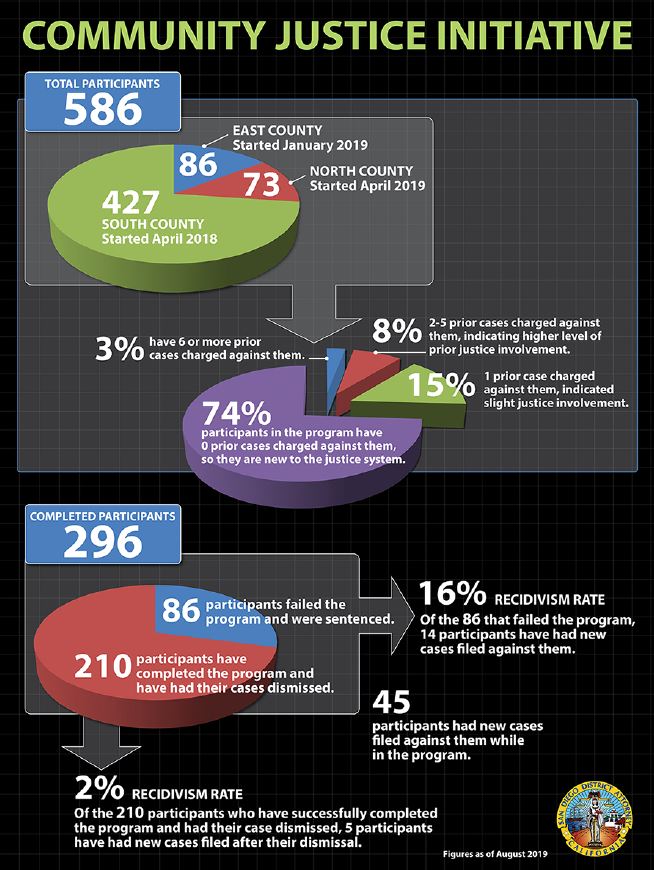New Campaign Against Domestic Violence
When a victim of domestic violence shows up in an emergency room or doctor’s office, the outward signs of abuse may not be visible. But their internal injuries could be life threatening, especially if they have been strangled.
A new outreach campaign, that includes resource kits and posters, is being distributed countywide to help health professionals better-recognize and report suspected domestic violence—especially strangulation. The campaign comes as prosecutors released new data showing the number of defendants charged with strangulation-related felony crimes has increased four-fold in the last six years. [TWEET THIS]
In line with the County of San Diego’s Live Well initiative, the San Diego County District Attorney’s Office (DA) and County of San Diego Health and Human Services Agency (HHSA) rolled out the new San Diego County Health CARES campaign today. The initiative is providing training and resources to hospitals, colleges and university health centers, community clinics, medical and nursing schools, paramedics/EMT’s, professional health organizations and primary care settings throughout the county. The outreach includes posters that encourage victims of domestic violence to talk about it with their healthcare provider.
[WATCH THE ANNOUNCEMENT, LIVE STREAMED]
“Surveys of healthcare providers in our county show that screening rates for intimate-partner violence are low, often due to healthcare providers feeling uncomfortable or uncertain with the topic and how to best respond to these patients’ needs,” said San Diego County District Attorney Summer Stephan. “Our goal is to provide tools, training and information that can be incorporated into routine practices within the healthcare system—protecting victims and saving lives. The bottom line is: if you have experienced domestic violence or strangulation by a partner, talk with your healthcare provider right away.”
There were more than 17,000 domestic violence incidents reported to law enforcement in San Diego County last year. Data shows that providing patients with an opportunity to speak to a healthcare provider about domestic violence results in patients being four times more likely to access to domestic violence resources. Statistics show that in the past 22 years, 13 percent of domestic violence-related murders in San Diego County involved strangulation.
“Healthcare providers play a critical role in identifying domestic violence and strangulation victims,” said Palomar Health Forensic Health Services Director Michelle Shores. “We want healthcare workers in San Diego to know that our program is a resource available to them and the patient. Our highly trained forensic nurses conduct on-site medical evidentiary exams to document injury and collect evidence to be submitted to law enforcement.”
More than 500 kits, 16,000 wallet cards and brochures in multiple languages, and some 9,000 posters in English and Spanish are being distributed to roughly 60 healthcare-related locations across San Diego County. The outreach campaign also includes materials in, Tagalog, Vietnamese and Arabic. Items from the kit can also be downloaded electronically at www.SDCountyHealthCARES.org. In addition, 100 healthcare professionals from hospitals, family health centers, nursing and medical schools, and other healthcare sites will attend a special training session tomorrow in North County to kick-off the campaign.
San Diego County Health CARES encourages healthcare staff to:
Conduct screening for domestic violence
Assess for signs and symptoms of strangulation
Report suspicious injuries to law enforcement
Evaluation of the patient by a trained forensic examiner
Safety plan with the patient and connect them to resources
By state law, healthcare workers are mandated reporters of suspected abuse. Over the past year, the District Attorney’s Office has been reminding various mandated reporters in healthcare sites, schools and financial institutions about their responsibilities to report suspected physical, sexual, financial abuse and suspicious injuries.
In 2017, The San Diego County District Attorney’s Office, local law enforcement officials and the San Diego City Attorney signed an agreement that outlines a coordinated community response on how to handle strangulation cases. The new Strangulation Protocol included a training video to teach law enforcement basic information about strangulation, such as the little amount of pressure it takes to cause significant damage. The DA’s Office files three times as many felony strangulation cases since the protocol was implemented.
October is Domestic Violence Awareness Month and Wednesday, October 16 is nationally-recognized as Health Cares About Domestic Violence Day. If you or someone you know is being abused by a current or former partner, call the National Domestic Violence Hotline (1-800-799-7233) for confidential support and assistance planning for safety. [TWEET THIS]













